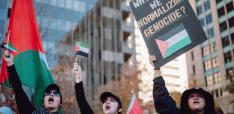The Magnitsky Sanctions and the Politics of Individual Accountability

Franklin De Vrieze, the WFD’s Senior Governance Advisor, explores the potentials and pitfalls of the UK sanctioning corrupt foreign officials.
Human rights violators should be scared. More and more democratic countries are holding them individually accountable for their crimes and are issuing ‘Magnitsky sanctions’ to target them where it hurts most: their pockets and their freedom to travel. The UK Government is seizing assets in Britain belonging to human rights violators, freezing their bank accounts, and banning them from entering the country. Now, UK MPs are pushing for and the Government is moving towards applying the same strategy toward corrupt officials. This could be an important deterrent for major corruption and help improve governance worldwide, as long as sanctions are applied consistently.
Laundering blood money
The UK National Crime Agency estimates that as much as £100 billion illegally flows through the UK every year, as criminals, money launderers and human rights abusers buy up luxury flats or send their children to British boarding schools.
Not for much longer. This summer, in a move that was welcomed across party lines, the UK introduced long-awaited sanctions against human rights abusers.
Speaking about the sanctions, which were brought about by a cross-party effort, Foreign Secretary Dominic Raab said: “If you’re a kleptocrat or an organised criminal you will not be able to launder your blood money in this country. Those with blood on their hands, the thugs of despots, the henchmen of dictators, will not be free to waltz into this country, to buy up property on the Kings Road, to do their Christmas shopping in Knightsbridge or frankly to siphon dirty money through British banks or other financial institutions.”
In other words, individuals named by the new regulations will not be able to travel to the UK or to use the British banking system and other institutions, and the authorities will freeze any property within the country which can be identified as belonging to the named individuals.
The new legislation uses powers contained in the 2018 Sanctions and Anti-Money Laundering Act, to deter, and provide accountability for, activities which amount to a serious violation of an individual’s human rights.
 Magnitsky sanctions
Magnitsky sanctions
These new regulations are known as Magnitsky Sanctions, after a Russian lawyer who exposed serious corruption and was subsequently killed in detention in Moscow.
In 2008, Sergei Magnitsky uncovered a £150 million theft from the Russian state that was sanctioned and carried out by officials from the country’s interior ministry. When Magnitsky went public, the people whose crimes he had uncovered arrested and imprisoned him. He died from torture, without medical assistance, in one of Moscow’s prisons in 2009.
Since, Magnitsky’s boss and businessman-turned-human rights activist Bill Browder has campaigned for justice. Browder’s innovative strategy aimed to get around the fact that the perpetrators were highly unlikely to be punished in Russia by pushing for sanctions abroad.
The UK regulations are part of a broader trend which began in the US. In 2012, US President Obama signed into law the ‘Magnitsky Bill’, which barred Russian officials involved in Magnitsky’s death from entering the US or using its banking system. Subsequently, Congress expanded its scope to dictators, kleptocrats and human rights abusers all over the world. Several EU countries and Canada have followed suit with their own Magnitsky acts. The EU Council has adopted a draft proposal for an EU Magnitsky Act that is expected to be approved by the EU Member States in late 2020 and Australia, Japan and Switzerland are currently debating similar legislation.
The UK blacklist
Although the names of persons under sanctions, including visa ban, have usually been kept confidential in the UK, under the new regulations that has changed. This summer, the then-Foreign Office named 49 individuals, including Saudis involved in the death of Jamal Khashoggi, Russians involved in the murder of Sergei Magnitsky, two high-ranking Myanmar military generals involved in the systematic brutality against the Rohingya and other ethnic minorities, and two organisations involved in the enforced labour, torture and murder in the North Korean gulags. Entities that are owned or controlled by these persons are subject to asset freezes.
British Overseas Territories have worked in concert with the UK’s new individual sanctions regime. The islands of Guernsey and Jersey and the Cayman Islands have frozen all accounts in their jurisdiction named in the UK sanctions list released on 6 July 2020. This is a significant development. Many kleptocrats keep their wealth hidden in offshore accounts, as revealed by investigations into the Panama Papers, for example.
Individual accountability
The Magnitsky sanctions create real world consequences that human rights violators and their masters are terrified of: individual accountability.
Sanctions can be used to change behaviour, constrain damaging action, or send a signal of condemnation. The threat of sanctions can also deter actors from taking unacceptable courses of action. Sanctions can be an effective and reasonable foreign policy tool if they are part of a broader foreign policy strategy for a country or thematic issue and are appropriate to the purposes they are intending to achieve. The freezing of financial assets of persons involved in serious human rights violations and abuses provides a deterrent to those involved, including those who profit financially from the violations and abuses. For many of these individuals, dependence on the western financial system is their key weakness.
Corruption offences
The Foreign Secretary has not, at this stage, imposed sanctions on persons that are deemed to be involved in corruption.
However, in March 2020, Members of the Houses of Commons and Lords made a case for the UK to follow the US and Canada in imposing sanctions on persons deemed to be involved in corruption in addition to those involved in human rights abuses. John Penrose MP, the Prime Minister’s anti-corruption champion, said: “Britain can do without kleptocrats and organised criminals whose dirty money comes from abusing human rights while they loot foreign countries.”
UK parliamentarians’ push is receiving a response. Leading the debate on the motion in the House of Lords to approve the Global Human Rights Regulations, Lord Ahmad, on behalf of the Government, said: “We are already considering how a corruption regime could be added to our armoury of legal weapons. In particular, we will look at the UN Convention against Corruption and at practice under existing frameworks in jurisdictions such as the United States and Canada.”
The UK is set to expand the UK Magnitsky legislation to include corruption offences. Kleptocrats and corrupt oligarchs will face visa bans and asset freezes under government plans to expand the new law.
Consistency is key
Some argue there is a compelling case for broadening the list of those being sanctioned to include the names of Chinese Communist Party officials involved in the repression in Hong Kong, Tibet and Xinjiang. The US has already imposed sanctions on specific Chinese officials over the mass detention and torture of millions of Muslim Uighurs in Xinjiang.
With regards to the massive human rights abuses in Belarus following the recent fraudulent presidential elections, the EU has decided to impose visa sanctions and asset freezes on Belarus officials and a list of names is being prepared. The US has already a sanctions architecture in place since 2006 that specifically targets persons undermining democratic processes in Belarus.
These examples, and many other cases of human rights violations and high-profile corruption, raise the question of consistency in the UK policy of financial sanctions. If these 49 individuals have been targeted, will further lists of human rights violators and corrupt officials from other countries be added?
With its global reach and the number of potential targets, any meaningful application of the new legislation is destined to be selective. “Since government ministers rather than law enforcement agencies will control the UK sanctions regimes, their actions will no doubt be informed by political considerations”, notes the UK Royal United Services Institute. The credibility of the regulations will depend on how consistently they are applied in practice. If conscientiously implemented, the legislation could further the UK’s commitment to being a force for good in the world.
In a recent paper for the Westminster Foundation for Democracy, Alex Thier argues that the UK should put democratic governance at the centre of its approach to foreign policy, development, and national security. The UK Global Human Rights Sanctions Regulations 2020 are a powerful new tool to protect democratic governance by tackling human rights abuses and corruption offences that fuel such abuses.
